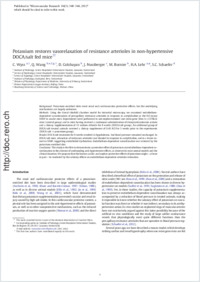Potassium restores vasorelaxation of resistance arterioles in non-hypertensive DOCA/salt fed mice
- Wyss, C. Institute of Pathology, Centre Hospitalier Universitaire Vaudois, Lausanne, Switzerland
- Wang, Qing Service of Nephrology, Centre Hospitalier Universitaire Vaudois, Lausanne, Switzerland - Division of Physiology, Department of Medicine, University of Fribourg, Switzerland - Chinese Hypertension League Institute, Beijing, China - Huazhong University of Science and Technology, Wuhan, China
- Golshayan, D. Service of Nephrology, Centre Hospitalier Universitaire Vaudois, Lausanne, Switzerland
- Nussberger, J. Service of Angiology, Centre Hospitalier Universitaire Vaudois, Lausanne, Switzerland
- Burnier, M. Service of Nephrology, Centre Hospitalier Universitaire Vaudois, Lausanne, Switzerland
- Lehr, H.A. Institute of Pathology, Centre Hospitalier Universitaire Vaudois, Lausanne, Switzerland
- Schaefer, S.C. Institute of Pathology, Inselspital, Bern, Switzerland
-
23.09.2012
Published in:
- Microvascular Research. - 2012, vol. 84, no. 3, p. 340–344
English
Background: Potassium-enriched diets exert renal and cardiovascular protective effects, but the underlying mechanisms are largely unknown.Methods: Using the dorsal skinfold chamber model for intravital microscopy, we examined endothelium-dependent vasorelaxation of precapillary resistance arterioles in response to acetylcholine or the NO donor SNAP in awake mice. Experiments were performed in uni-nephrectomized one renin gene (Ren-1c) C57BL/6 mice (control group) and in mice having received a continuous administration of deoxycorticosterone acetate and a dietary supplementation of 1% sodium chloride for 8 weeks (DOCA/salt group). An additional group of DOCA/salt treated animals received a dietary supplement of 0.4% KCl for 3 weeks prior to the experiments (DOCA/salt + potassium group).Results: DOCA/salt treatment for 8 weeks resulted in hypokalemia, but blood pressure remained unchanged. In DOCA/salt mice, relaxation of resistance arterioles was blunted in response to acetylcholine, and to a lesser extent to SNAP, suggesting endothelial dysfunction. Endothelium-dependent vasorelaxation was restored by the potassium‐enriched diet.Conclusion: This study is the first to demonstrate a protective effect of potassium on endothelium-dependent vasorelaxation in the absence of confounding anti-hypertensive effects, as observed in most animal models and the clinical situation. We propose that the known cardio- and nephro-protective effects of potassium might – at least in part – be mediated by the salutary effects on endothelium-dependent arteriolar relaxation.
- Faculty
- Faculté des sciences et de médecine
- Department
- Département de Médecine
- Language
-
- English
- Classification
- Biological sciences
- License
-
License undefined
- Identifiers
-
- RERO DOC 30518
- DOI 10.1016/j.mvr.2012.09.005
- Persistent URL
- https://folia.unifr.ch/unifr/documents/302596
Statistics
Document views: 127
File downloads:
- pdf: 232
